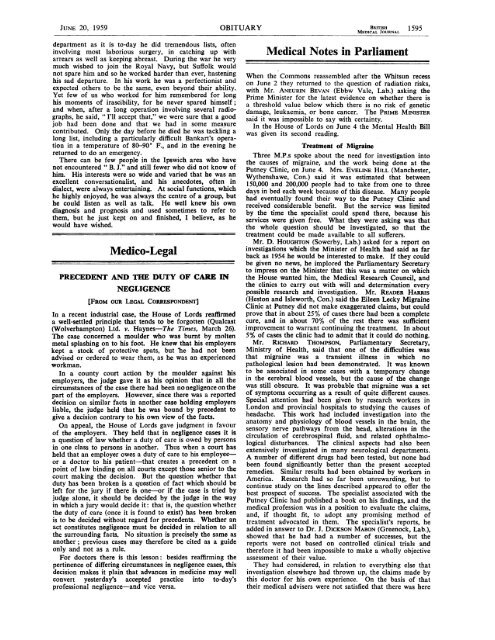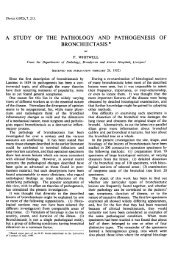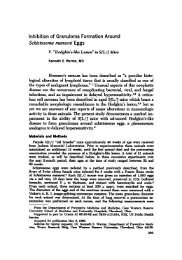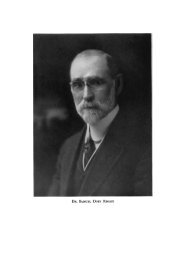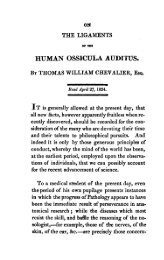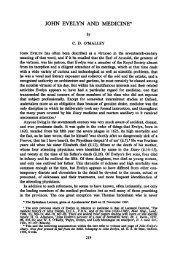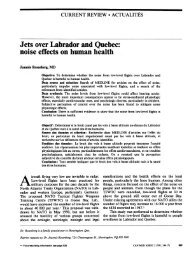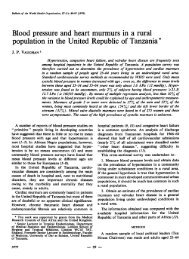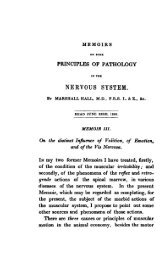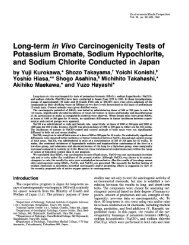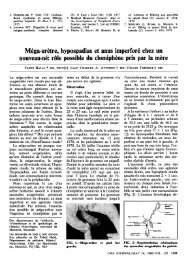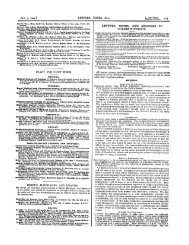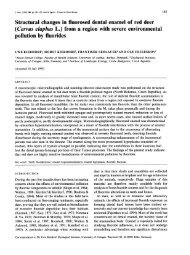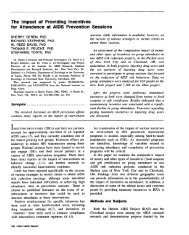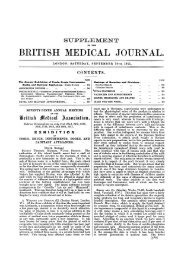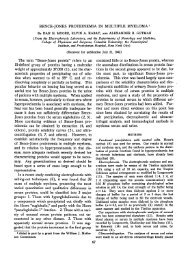You also want an ePaper? Increase the reach of your titles
YUMPU automatically turns print PDFs into web optimized ePapers that Google loves.
JUNE 20, 1959 OBITUARY MEDICAL JOURNAL1595<br />
department as it is to-day he did tremendous lists, often<br />
involving most laborious surgery, in catching up with<br />
arrears as well as keeping abreast. During the war he very<br />
much wished to join the Royal Navy, but Suffolk would<br />
not spare him and so he worked harder than ever, hastening<br />
his sad departure. In his work he was a perfectionist and<br />
expected others to be the same, even beyond their ability.<br />
Yet few of us who worked for him remembered for long<br />
his moments of irascibility, for he never spared himself;<br />
and when, after a long operation involving several radiographs,<br />
he said, " I'll accept that," we were sure that a good<br />
job had been done and that we had in some measure<br />
contributed. Only the day before he died he was tackling a<br />
long list, including a particularly difficult Bankart's operation<br />
in a temperature of 80-90' F., and in the evening he<br />
returned to do an emergency.<br />
There can be few people in the Ipswich area who have<br />
not encountered " B. J." and still fewer who did not know of<br />
him. His interests were so wide and varied that he was an<br />
excellent conversationalist, and his anecdotes, often in<br />
dialect, were always entertaining. At social functions, which<br />
he highly enjoyed, he was always the centre of a group, but<br />
he could listen as well as talk. He well knew his own<br />
diagnosis and prognosis and used sometimes to refer to<br />
them, but he just kept on and finished, I believe, as he<br />
would have wished.<br />
Medico-Legal<br />
PRECEDENT AND THE DUTY OF CARE IN<br />
NEGLIGENCE<br />
[FROM ouR LEGAL CORRESPONDENT]<br />
In a recent industrial case, the House of Lords reaffirmed<br />
a well-settled principle that tends to be forgotten (Qualcast<br />
(Wolverhampton) Ltd. v. Haynes-The Times, March 26).<br />
The case concerned a moulder who was burnt by molten<br />
metal splashing on to his foot. He knew that his employers<br />
kept a stock of protective spats, but 'he had not been<br />
advised or ordered to wear them, as he was an experienced<br />
workman.<br />
In a county court action by the moulder against his<br />
employers, the judge gave it as his opinion that in all the<br />
circumstances of the case there had been no negligence on the<br />
part of the employers. However, since there was a reported<br />
decision on similar facts in another case holding employers<br />
liable, the judge held that he was bound by precedent to<br />
give a decision contrary to his own view of the facts.<br />
On appeal, the House of Lords gave judgment in favour<br />
of the employers. They held that in negligence cases it is<br />
a question of law whether a duty of care is owed by persons<br />
in one class to persons in another. Thus when a court has<br />
held that an employer owes a duty of care to his employeeor<br />
a doctor to his patient-that creates a precedent on a<br />
point of law binding on all courts except those senior to the<br />
court making the decision. But the question whether that<br />
duty has been broken is a question of fact which should be<br />
left for the jury if there is one-or if the case is tried by<br />
judge alone, it should be decided by the judge in the way<br />
in which a jury would decide it: that is, the question whether<br />
the duty of care (once it is found to exist) has been broken<br />
is to be decided without regard for precedents. Whether an<br />
act constitutes negligence must be decided in relation to all<br />
the surrounding facts. No situation is precisely the same as<br />
another; previous cases may therefore be cited as a guide<br />
only and not as a rule.<br />
For doctors there is this lesson: besides reaffirming the<br />
pertinence of differing circumstances in negligence cases, this<br />
decision makes it plain that advances in medicine may well<br />
convert yesterday's accepted practice into to-day's<br />
professional negligence-and vice versa.<br />
Medical Notes in Parliament<br />
When the Commons reassembled after the Whitsun recess<br />
on June 2 they returned to the question of radiation risks,<br />
with Mr. ANEURIN BEVAN (Ebbw Vale, Lab.) asking the<br />
Prime Minister for the latest evidence on whether there is<br />
a threshold value below which there is no risk of genetic<br />
damage, leukaemia, or bone cancer. The PRIME MINSTER<br />
said it was impossible to say with certainty.<br />
In the House of Lords on June 4 the Mental Health Bill<br />
was given its second reading.<br />
Treatment of Migraine<br />
Three M.P.s spoke about the need for investigation into<br />
the causes of migraine, and the work being done at the<br />
Putney Clinic, on June 4. Mrs. EVELiNE HILL (Manchester,<br />
Wythenshawe, Con.) said it was estimated that between<br />
150,000 and 200,000 people had to take from one to three<br />
days in bed each week because of this disease. Many people<br />
had eventually found their way to the Putney Clinic and<br />
received considerable benefit. But the service was limited<br />
by the time the specialist could spend there, because his<br />
services were given free. What they were asking was that<br />
the whole question should be investigated, so that the<br />
treatment could be made available to all sufferers.<br />
Mr. D. HOUGHTON (Sowerby, Lab.) asked for a report on<br />
investigations which the Minister of Health had said as far<br />
back as 1954 he would be interested to make. If they could<br />
be given no news, he implored the Parliamentary Secretary<br />
to impress on the Minister that this was a matter on which<br />
the House wanted him, the Medical Research Council, and<br />
the clinics to carry out with will and determination every<br />
possible research and investigation. Mr. READER HARRIS<br />
(Heston and Isleworth, Con.) said the Eileen Lecky Migraine<br />
Clinic at Putney did not make exaggerated claims, but could<br />
prove that in about 25% of cases there had been a complete<br />
cure, and in about 70% of the rest there was sufficient<br />
improvement to warrant continuing the treatment. In about<br />
5% of cases the clinic had to admit that it could do nothing.<br />
Mr. RICHARD THOMPSON, Parliamentary Secretary,<br />
Ministry of Health, said that one of the difficulties was<br />
that migraine was a transient illness in which no<br />
pathological lesion had been demonstrated. It was known<br />
to be associated in some cases with a temporary change<br />
in the cerebral blood vessels, but the cause of the change<br />
was still obscure. It was probable that migraine was a set<br />
of symptoms occurring as a result of quite different causes.<br />
Special attention had been given by research workers in<br />
London and provincial hospitals to studying the causes of<br />
headache. This work had included investigation into the<br />
anatomy and physiology of blood vessels in the brain, the<br />
sensory nerve pathways from the head, alterations in the<br />
circulation of cerebrospinal fluid, and related ophthalmological<br />
disturbances. The clinical aspects had also been<br />
extensively investigated in many neurological departments.<br />
A number of different drugs had been tested, but none had<br />
been found significantly better than the present accepted<br />
remedies. Similar results had been obtained by workers in<br />
America. Research had so far been unrewarding, but to<br />
continue study on the lines described appeared to offer the<br />
best prospect of success. The specialist associated with the<br />
Putney Clinic had published a book on his findings, and the<br />
medical profession was in a position to evaluate the claims,<br />
and, if thought fit, to adopt any promising method of<br />
treatment advocated in them. The specialist's reports, he<br />
added in answer to Dr. J. DICKSON MABON (Greenock, Lab.),<br />
showed that he had had a number of successes, but the<br />
reports were not based on controlled clinical trials and<br />
therefore it had been impossible to make a wholly objective<br />
assessment of their value.<br />
They had considered, in relation to everything else that<br />
investigation elsewhe.re had thrown up, the claims made by<br />
this doctor for his own experience. On the basis of that<br />
their medical advisers were not satisfied that there was here


